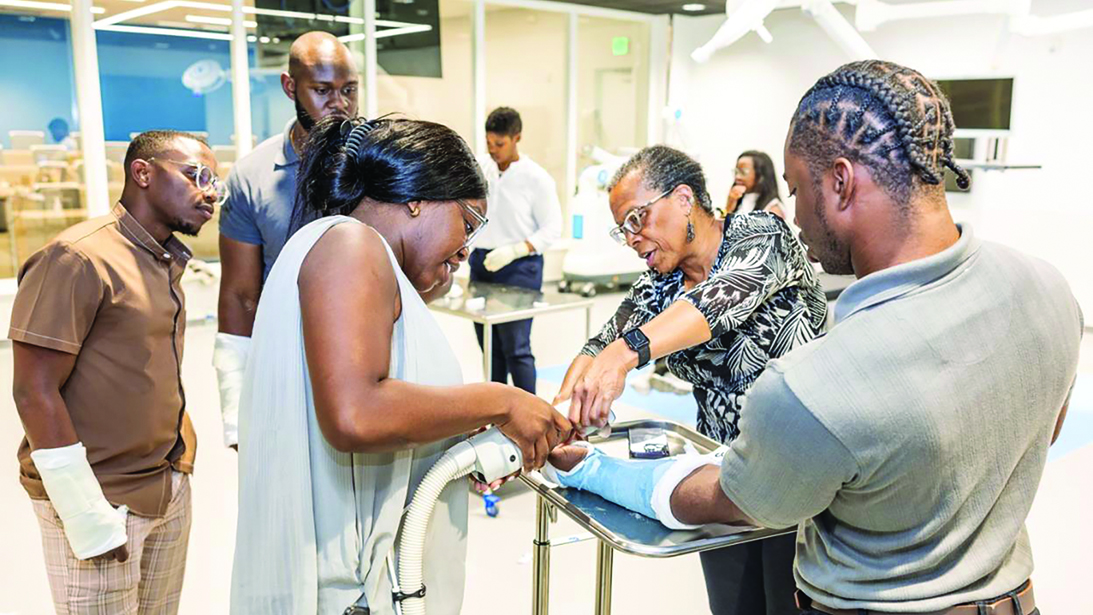
Since its launch in 2022, the AAOS IDEA Grant Program® has provided key funding to support and encourage orthopaedic professionals across the United States, those already in practice as well as those in the pipeline. AAOS created the program to prompt real, lasting, and measurable change toward the advancement of diversity, equity, and inclusion (DEI) within orthopaedics.
For recipients, the IDEA Grant Program represents a tangible investment in their work and a vital opportunity for greater impact in the field of orthopaedics. Funding from Stryker, a global leader in medical technology, has helped extend the reach of the grant program. With this funding, programs nationwide that are making strides to address gaps in gender, culture, and ethnicity in orthopaedics have increased access to opportunities for groups who are underrepresented in the specialty.
“It’s been nothing short of inspiring to bear witness to the important work of so many different institutions benefitting from the AAOS IDEA Grant Program,” said AAOS Diversity Advisory Board (DAB) Chair Holly Pilson, MD, FAAOS, FAOA, whose group is responsible for reviewing applications and recommending final grant recipients to the AAOS Board of Directors for approval. “I know firsthand the doors that funding and support like this program can open for those who may have historically felt left behind in our field. It takes those doing the hard work at the ground level to create lasting change, and the DAB is committed to lifting those trailblazers up, with the IDEA Grant at the heart of our efforts.”
Though each recipient has the backing of AAOS in common, their respective goals and accomplishments are diverse. For those in the Touchpoints Track, the awarded funds are intended to support events which integrate DEI initiatives in orthopaedic surgery for learners and/or practicing surgeons. The Society of Military Orthopaedic Surgeons (SOMOS) utilized its grant to provide crucial funding to the SOMOS E. Anthony Rankin Scholarship Program. This scholarship allowed 10 medical students from underrepresented groups to complete a 2- or 4-week rotation at either the Walter Reed National Medical Center in Maryland or the San Diego Naval Medical Center.
Programs falling under the Retention Track received funds enabling them to work longitudinally toward recruiting and retaining a diverse workforce in orthopaedic surgery. One such program, the Ruth Jackson Orthopaedic Society (RJOS), is making critical efforts to promote the professional development of women in orthopaedics. In 2023, IDEA Grant funds made it possible for 14 female medical students to travel to the RJOS Annual Meeting in Las Vegas, where they engaged in mentorship, networking, skill building, and DEI-focused programming. Opportunities like these are key to building a strong foundation for the next generation of dedicated and diverse orthopaedic professionals.
The remaining two tracks focus on recruiting and retaining diverse talent in orthopaedics, both in academic and non-academic practice settings to guarantee a broad impact. The Academic Retention/Support Track is focused on supporting students from backgrounds traditionally underrepresented in the field as they enter orthopaedic programs in academic settings. Wake Forest University Health Sciences utilized its grant to create a speaker series titled “ODySSEY in Orthopaedics (Orthopaedic Diversity Speaker Series Educating Youth in Orthopaedics).” It aims to expose students in local Title I middle schools to career paths in orthopaedic surgery, with speakers selected to represent traditionally underrepresented groups in the field. The events, held quarterly throughout 2023 and planned to continue this year, brought together dozens of students in schools across North Carolina for engaging, hands-on activities and invaluable lessons from orthopaedic professionals.
Finally, the Community Retention/ Support Track is designated for orthopaedic organizations in a private, remote setting or outside of an academic institution. The J. Robert Gladden Orthopaedic Society (JRGOS) was awarded $25,000 to support the creation of the JRGOS Orthopaedic Intern Strategic Mentoring Workshop. This program made it possible for 20 incoming orthopaedic interns to travel to the Zimmer Biomet Great Lakes Surgical Institute for hands-on training and mentorship at a pivotal stage in their careers. The workshop focused on building necessary skills and best practices critical to successful completion of residency.
According to Dr. Pilson, it remains a critical time for diversity in orthopaedics. At an organizational level, AAOS has made progress toward its goal of evolving its culture and governance to be more diverse, and it remains committed to helping address decades of inertia surrounding persistent disparities across orthopaedics, all to better serve orthopaedic patients.
“Thanks to this program, more than 40 grants have fueled transformative DEI opportunities and promoted access to drive change and address the gaps,” said Dr. Pilson. “Our profession and our patients are the beneficiaries of these efforts.”
To learn more about the program, grant recipients, and application process, visit aaos.org/IDEA.
Tanner Chaille is a member of the Marketing, Communications, and Membership team at AAOS and the marketing liaison for the IDEA Grant program.